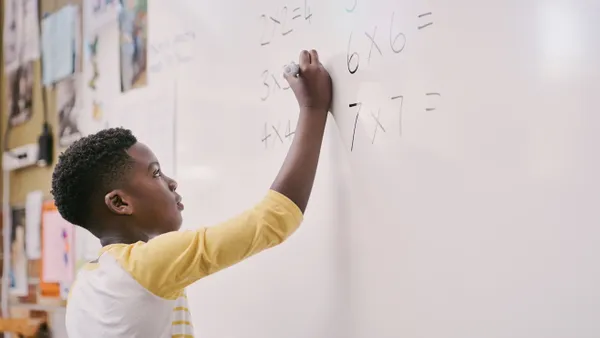Dive Brief:
- International teacher and literacy consultant Matthew James Friday had his 7th-grade classes write and perform character-driven one-act plays delivered as monologues, using a 10-step process he believed could strengthen students’ writing skills and help those who felt shy to explore and express their inner thoughts, he writes for Edutopia.
- He started by asking students to view monologue performances and then develop characters of their own through role-playing and improv. He also taught students about dramatic structure and had them arrange their pieces in terms of length and acts.
- Students worked on drafts and read them aloud to each other for feedback and to develop comfort in their voices, and Friday ensured those who struggled weren’t punished with bad grades. Some students filmed their finished projects, while others performed them live for a school-wide audience to share their work.
Dive Insight:
Performing, writing and learning about monologues can produce more than just an appreciation for drama and writing. The process can also help students build confidence in public speaking and develop storytelling skills.
The ability to synthesize thoughts succinctly and deliver them in a way that engages the listener can be applied in a work environment during meetings and even when drafting a college application. Students develop presence along with confidence in their voice.
Juan Carlos Salinas runs monologue workshops with high school students as the education coordinator at The New Group, a New York-based theater group that runs educational programs for students. Learners may, for example, gain the skills to write a monologue they can also use as an essay on college admission applications, including the Common Application.
“Your common app story is more a monologue than a traditional English paper,” Salinas said. “You want to make sure it reads well and sounds well as committees read these aloud.”
Having students deliver soliloquies or monologues aloud, whether in a drama program or their English language arts class, can also deepen the learning process. The Folger Shakespeare Library offers lesson plans on teaching monologues and online workshops to help educators bring monologues into their classrooms.
For Peggy O’Brien, the library’s director of education, something different happens to the way students learn when they perform or say these pieces out loud, helping them consider not just language but what words convey.
“You can read a monologue on a page, and the teacher can explain what that means, but it’s not nearly as powerful as what has to happen if a teacher says, ‘Take the first 10 lines with a partner and figure it out,” O’Brien said. “It gets you inside the language, and that is a powerful way to learn.”













